A mesh router is a type of wireless networking device that uses multiple routers or access points (APs) to create a single, seamless wireless network. Unlike traditional routers that rely on a single router to cover a large area, mesh routers use a network of interconnected devices to provide coverage across a much larger area with greater reliability and speed.
Each mesh router acts as a node in the network, and they work together to provide blanket coverage for your entire home or office. By placing multiple mesh routers throughout your space, you can eliminate dead spots and ensure that every device in your network has a strong and reliable connection.
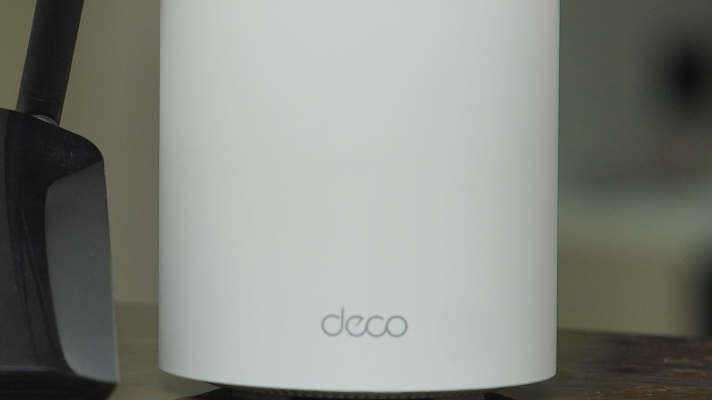
Mesh routers use advanced algorithms to determine the best path for data to travel through the network, and they can automatically switch between different access points to provide the best possible connection. This makes them ideal for large homes, multi-story buildings, and offices where traditional routers often struggle to provide reliable coverage.
In a Nutshell – Why do you need a mesh router
You need a mesh router if you want to eliminate dead spots and ensure that every device in your home or office has a strong and reliable wireless connection. Mesh routers use multiple interconnected devices to create a seamless network that can cover a large area with greater speed and reliability than traditional routers. By placing multiple mesh routers throughout your space, you can ensure that every device in your network has a strong signal, regardless of where it is located. This makes them ideal for large homes, multi-story buildings, and offices where traditional routers often struggle to provide reliable coverage.
The Pro and Con of any mesh router
Pros:
- Greater coverage: Mesh routers use multiple interconnected devices to provide greater coverage than traditional routers, which can help eliminate dead spots and ensure that every device in your network has a strong signal.
- Improved reliability: Mesh routers use advanced algorithms to determine the best path for data to travel through the network, which can improve reliability and reduce the risk of dropped connections.
- Scalability: Mesh networks are highly scalable, which means you can easily add additional devices as needed to expand your coverage.
- Seamless connectivity: Mesh networks create a seamless wireless network, so you can move around your home or office without having to manually switch between different access points.
Cons:
- Cost: Mesh routers can be more expensive than traditional routers, especially if you need multiple devices to cover a large area.
- Complexity: Setting up a mesh network can be more complex than setting up a traditional network, and may require some technical expertise.
- Interference: If you have multiple mesh devices in close proximity to each other, they may interfere with each other’s signals, which can affect performance.
- Dependency on wireless signal: Mesh networks rely entirely on wireless signals, which means they can be affected by interference from other devices or environmental factors like walls and furniture.
5 Mesh Router Currently available in the market
- TP-Link Deco X20
- Asus XT8
- TP-Link Deco X75
- Linksys MX5400
- Netgear RBK85x
TP-Link Deco X20
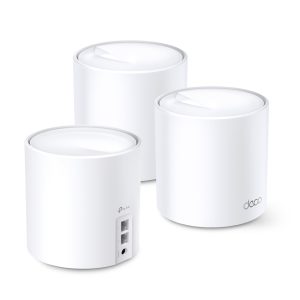
Pros:
- Fast speeds: The TP-Link Deco X20 is a tri-band mesh router that can deliver speeds of up to 1,800Mbps, which makes it suitable for bandwidth-intensive tasks like streaming and gaming.
- Easy setup: The Deco X20 is easy to set up and can be managed using a mobile app, which makes it easy to monitor your network and troubleshoot any issues that arise.
- Good coverage: The Deco X20 can cover an area of up to 4,000 square feet, which makes it suitable for use in large homes or multi-story buildings.
- Compatible with voice assistants: The Deco X20 is compatible with Amazon Alexa and Google Assistant, which means you can control your network using voice commands.
Cons:
- Limited ports: The Deco X20 has only two Ethernet ports, which may be insufficient for users who need to connect multiple wired devices to their network.
- No USB ports: The Deco X20 does not have any USB ports, which means you can’t connect external storage devices or printers directly to the router.
- No dedicated backhaul band: Unlike some other mesh routers, the Deco X20 does not have a dedicated backhaul band, which may affect performance in some scenarios.
Price: $220
Asus XT8
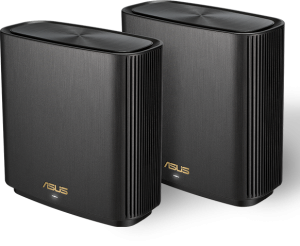
Pros:
- Fast speeds: The Asus XT8 is a tri-band mesh router that can deliver speeds of up to 6,000Mbps, which makes it suitable for high-bandwidth tasks like 4K streaming and online gaming.
- Excellent coverage: The XT8 can cover an area of up to 5,500 square feet, which makes it suitable for use in large homes or multi-story buildings.
- Easy setup: The Asus XT8 is easy to set up and can be managed using a mobile app, which makes it easy to monitor your network and troubleshoot any issues that arise.
- Robust parental controls: The XT8 has robust parental controls that allow you to set time limits, block websites, and restrict access to certain devices on your network.
Cons:
- Expensive: The Asus XT8 is relatively expensive compared to other high-end mesh routers on the market, which may be a drawback for some users.
- No dedicated backhaul band: Like the TP-Link Deco X20, the Asus XT8 does not have a dedicated backhaul band, which may affect performance in some scenarios.
- Limited ports: The XT8 has only two Ethernet ports, which may be insufficient for users who need to connect multiple wired devices to their network.
Price:$450
TP-Link Deco X75
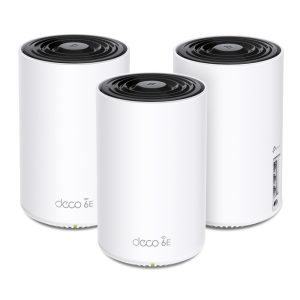
Pros:
- Very fast speeds: The TP-Link Deco X75 is a tri-band mesh router that can deliver speeds of up to 5,400Mbps, which makes it suitable for bandwidth-intensive tasks like 4K streaming and online gaming.
- Excellent coverage: The X75 can cover an area of up to 7,000 square feet, which makes it ideal for large homes, multi-story buildings, and offices.
- Easy setup: The TP-Link Deco X75 is easy to set up and can be managed using a mobile app, which makes it easy to monitor your network and troubleshoot any issues that arise.
- Good security features: The X75 has robust security features, including WPA3 encryption, parental controls, and antivirus protection.
Cons:
- Expensive: The TP-Link Deco X75 is relatively expensive compared to other high-end mesh routers on the market, which may be a drawback for some users.
- Limited ports: The X75 has only two Ethernet ports, which may be insufficient for users who need to connect multiple wired devices to their network.
- No USB ports: The Deco X75 does not have any USB ports, which means you can’t connect external storage devices or printers directly to the router.
Price:$500
Linksys MX5400
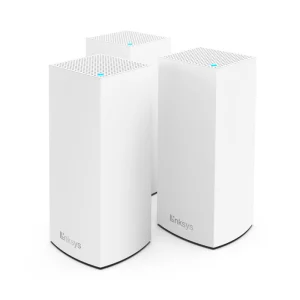
Pros:
- Fast speeds: The Linksys MX5400 is a dual-band mesh router that can deliver speeds of up to 5,400Mbps, which makes it suitable for bandwidth-intensive tasks like 4K streaming and online gaming.
- Good coverage: The MX5400 can cover an area of up to 3,000 square feet, which makes it suitable for use in medium-sized homes or apartments.
- Easy setup: The Linksys MX5400 is easy to set up and can be managed using a mobile app, which makes it easy to monitor your network and troubleshoot any issues that arise.
- Good security features: The MX5400 has robust security features, including WPA3 encryption and parental controls.
Cons:
- Limited customization: The Linksys MX5400 does not offer as many customization options as some other high-end mesh routers on the market, which may be a drawback for users who want more control over their network.
- Limited ports: The MX5400 has only two Ethernet ports, which may be insufficient for users who need to connect multiple wired devices to their network.
- Expensive: The Linksys MX5400 is relatively expensive compared to other dual-band mesh routers on the market, which may be a drawback for budget-conscious users.
Price:$400
Netgear RBK85x

Pros:
- Fast speeds: The Netgear RBK85x is a tri-band mesh router that can deliver speeds of up to 5,200Mbps, which makes it suitable for bandwidth-intensive tasks like 4K streaming and online gaming.
- Excellent coverage: The RBK85x can cover an area of up to 5,000 square feet, which makes it ideal for large homes, multi-story buildings, and offices.
- Easy setup: The Netgear RBK85x is easy to set up and can be managed using a mobile app, which makes it easy to monitor your network and troubleshoot any issues that arise.
- Good security features: The RBK85x has robust security features, including WPA3 encryption and parental controls.
Cons:
- Expensive: The Netgear RBK85x is relatively expensive compared to other high-end mesh routers on the market, which may be a drawback for some users.
- Limited customization: The RBK85x does not offer as many customization options as some other high-end mesh routers on the market, which may be a drawback for users who want more control over their network.
- Limited ports: The RBK85x has only two Ethernet ports on the router and one on each satellite unit, which may be insufficient for users who need to connect multiple wired devices to their network.
Price:$500
Decision
In conclusion, mesh routers are an excellent option for users who need to extend their Wi-Fi coverage throughout their homes or offices. They offer several benefits over traditional routers, including better coverage, faster speeds, and easier setup and management.
When considering purchasing a mesh router, it is essential to weigh the pros and cons of different models to find one that meets your needs and budget. TP-Link Deco X20, Asus XT8, TP-Link Deco X75, and Linksys MX5400 are all high-quality mesh routers with unique features and drawbacks. It’s important to do your research and compare different models to find one that suits your specific needs.


